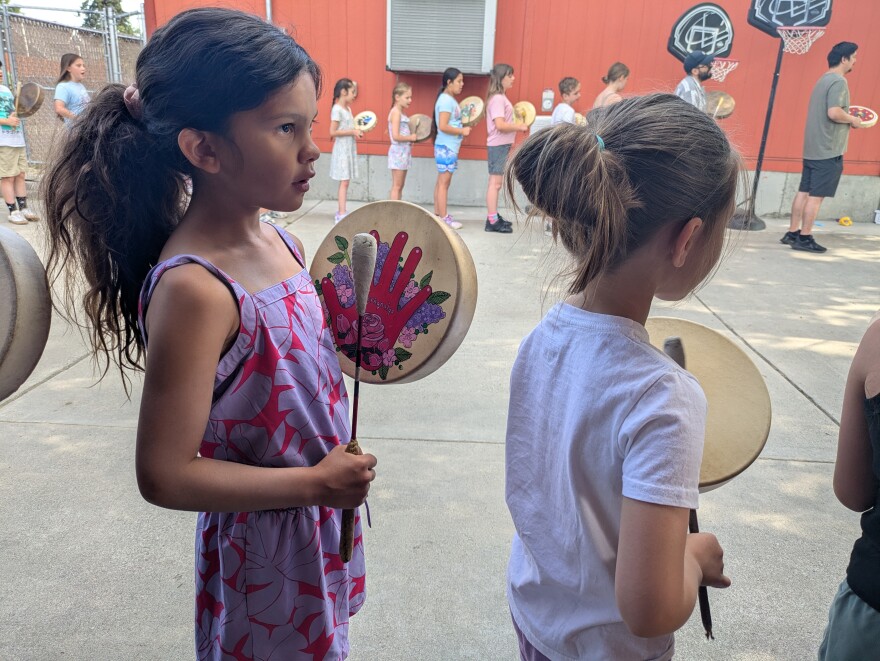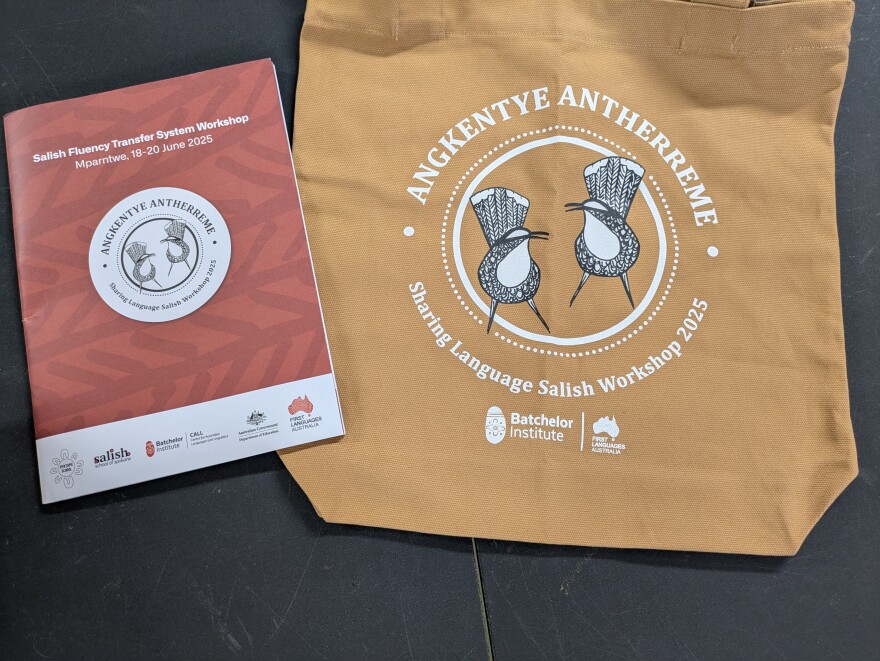Despite its small size, the Salish School of Spokane has become known around the country—and the world—for its effective way of teaching endangered Indigenous languages.
Through their connection to another language revitalization project with the Yuchi people in Oklahoma, Salish School leaders were eventually approached by the Pertame people of Australia.
"Every summer we do our summer immersion symposium in which we train other Indigenous language groups and communities on our fluency transfer system and how we've formed our immersion school how we operate and how we funded et cetera," Principal and Business Manager Christopher Parkin told SPR News. "In 2022, we were holding that summer immersion symposium on the Rocky Boy Reservation, Montana, quite the middle of nowhere. And out of the blue we get this registration from the Pertame people in Australia. They're sending six people.
"We're like, 'Whoa, where'd this come from?' So we asked them, and they said 'Oh the Yuchis told us about you guys, said that your method would be really good for us.'"
So a cohort from the Pertame people attended the Salish School's standard training on immersion education and the school's fluency transfer system.
"Apparently they loved it because they had translated our first book into their language before their plane landed in Alice Springs," Parkin said. "So as they were on flights and in airports, they translated our whole book. They were very excited about it, and they went home and implemented it just based on that two-day training."
As the relationship between the two groups developed, the Pertame, with funding from First Languages Australia, eventually asked the Salish School leaders if they might lead a training in June 2025 for 48 Aboriginal Australian and Torres Strait Islander groups in their language revitalization methods.
SPR’s Owen Henderson sat down with Parkin to talk about his recent trip down under and the Salish School’s methodology.

This interview has been edited for length and clarity.
OWEN HENDERSON: So, you and several of your family members went down to Australia to teach about your Indigenous language fluency system to a number of Indigenous communities there. We'll talk about the teaching and the fluency system both in a moment, but first just tell me what it was like for you to get that call, to get that ask.
CHRISTOPHER PARKIN: Yeah, to be asked to go to the other side of the earth and share our work was just astounding.
And really the whole time we were there, we were just kind of astounded. Like my wife, LaRae Wiley, has always just been very personal, very intimate. She had this vision to bring language back to our family and then ultimately bring language back to the community and her Sinixt and other Salish people.
But we've always just kind of been nose to the grindstone, doing our thing, trying to make it work out and to have that suddenly mean something to a bunch of people on the other side of the earth in Australia. It was just astonishing. Nothing short of astonishing.
OH: So now let's talk a little bit about what got you guys asked to go, the language fluency transfer system. What specifically about this system makes it so useful?
CP: In the case of n̓səl̓̓xčin̓, the language that we speak in our family, and there's the language of instruction at Salish School of Spokane, we have two surviving first language speaker elders in the United States on the Colville Indian Reservation and then maybe 20, 25 more in the Okanagan Valley of British Columbia. In the case of critically, critically endangered Indigenous languages, of course, every community wants to revitalize their language.
And there's a universal recognition that the language is the keystone to culture and that ultimately a strong language situation makes for a strong culture situation, makes for a strong society and community, right? And without language, communities continue to struggle to heal from genocide and colonization, right?
So everybody wants to revitalize their language. Every Indigenous language community across North America, and it turns out the world, wants to revitalize their Indigenous language, but very few people have had success.
So the Pertame people of Alice Springs, Australia, have the only Indigenous language immersion language nest in Australia.
But when they adopted our fluency transfer system and turned around and started teaching the parents of the language nest and just had a real quick market improvement and increased language and increased levels of learning among the parents, that really caught people's attention.
So the Pertame school and their language nest has a relationship with First Languages Australia—that's a division of the Department of Education Australia that is now working to promote and revitalize Indigenous languages. So suddenly a lot of attention turned their way and like, ‘Where'd this come from? How are you doing this? No one's doing this. No one has had that kind of little quick bump up in success before. What's going on?’
Of course, they shared that. You know, it was actually about 18 months ago where they threw out the idea, ‘Hey, if we could find the funding, would you guys be willing to come here and do the training for other aboriginal language groups and Torres Strait Islander groups?’ And we're like, ‘Uh, yeah, I guess so.’
A team of six of us—LaRae Wiley is our co-founder of Salish School of Spokane, my wife, and so she and I and our son, Grahm Wiley-Camacho, who is one of our lead elementary teachers and his wife, Dominique Wiley-Camacho, another one of our lead elementary teachers.
And then their two daughters who are in fourth and seventh grade. That was our training team for Salish School of Spokane. So First Language of Australia flew us to Alice Springs and they gathered—I think it was—48 different language groups. And they were focusing on pairs of fluent speaker and then a new learner.

And they brought in these language pairs from all across Australia, put us all up. And they did a convening with those communities to get their input for the first day.
And then the second two days was our fluency transfer system training in which we shared kind of our family language journey, how we came to the point where we're a three generation fluent speaking Salish family.
So LaRae and I and Grahm and Dominique and their kids are all fluent speakers of language. As far as we know, we're the only three generation fluent family and certainly the only three generation fluent family that are all second language learners. We've become fluent using this fluency transfer system.
So our son, Grahm, gave us for half an hour, talked in Salish to these people and his daughter Seneca, who's in seventh grade translated for him. And I think that was the thing that blew people away the most because that's what everybody wants.
We want our kids and grandkids to speak their Indigenous languages and to be culturally connected, connected to the community, connected to the land. So we got a lot of just feedback. And so the people were so moved and so kind and congratulatory to Seneca, seeing her stand up, interpret for her dad for a half an hour, speaking in their language.
And then we went on to talk about how we worked with our mentor and elder, Sʕamtíc̓aʔ, and how she gifted us the language and that we were able to record, record so many materials with her to create our fluency transfer system. And then in the afternoon of that first day and all day the second day, we did immersion teaching with these groups. So we divided them up and Grahm and Dominique each taught a large group and we taught them Salish.
We found it's very difficult to describe how you implement this fluency transfer system through full immersion. So we teach in full immersion. So rather than tell them about it, we taught them.
So on the first day, they taught a lesson from our Level One language book in n̓səl̓̓xčin̓, Colville Salish. So they taught all these Aboriginal Australians and Torres Strait Islanders Salish. And so they could experience this full immersion methodology.
And then the second day, we taught them a little traditional story, our čaptíkʷɬ, our coyote stories. On the second day, the Pertame people did that same demonstration using—because they've developed Level One already in their language. So that folks could see, like, ‘Here is an Australian Aboriginal language doing the same thing, teaching it through immersion, having the same outcomes.’
OH: You did say that it is a difficult methodology to describe, but speaking a little bit more generally, can you describe for people who are not in the language teaching space, how immersion differs from, you know, learning a second language the way it's traditionally taught in American schools?
CP: Well, I would say in Indigenous language communities, it turns out across the world, the outsiders who've had a lot of interest in Indigenous language are academic linguists. And so lots of universities and academic linguists have become involved in Indigenous language communities. And their involvement has tended to change the course of communities that are trying to revitalize their language.
They see the work of linguists and they tend to like, ‘Oh, we can try and do that.’ Their community members will go study linguistics, but typically doing descriptive linguistics work with Indigenous language just doesn't yield fluent community members because it's just a different—it has a different set of goals and outcomes. Our fluency transfer system is very much focused on training new, fluent community members.
And the goal is to communicate. The goal is to be able to use the language in your daily life, just to live your life and to reconnect with culture, reconnect with the land and with each other. So one of the things we talk about in our presentation is we don't learn about the language, we learn the language.
Our learners don't have a lot of meta-knowledge. They aren't going to be able to explain the mechanics of what's going on in the syntax or morphology of the language, but they can talk. They can communicate with kids at Salish School of Spokane. We can talk about what we did over the weekend, right?
So the object of everything we do is to be able to communicate and live in the language. In a nutshell, it has a language and a stories book at four levels. So at each level, there's a language book where we're kind of practicing communicative phrases and at each level, there's also stories.
So traditional stories are a bedrock of Salish culture. The čaptíkʷɬ are the Bible and they are Shakespeare and they are the constitution. They contain all of the wisdom and beliefs and ethical instructions and even law of traditional Salish societies.
OH: limləmt, Chris Parkin, thank you so much.
CP: Awesome to have you here on the site, Owen.


